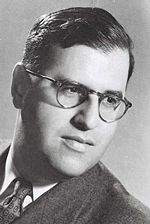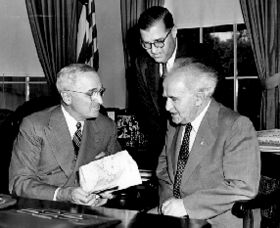Abba Eban
| Abba Eban | |
|---|---|

| |
| Date of birth | February 2 1915 |
| Place of birth | Cape Town, South Africa |
| Year of Aliyah | 1940 |
| Date of death | 17 November 2002 (aged 87) |
| Knesset(s) | 4th, 5th, 6th, 7th, 8th, 9th, 10th, 11th |
| Party | Alignment |
| Former parties | Mapai |
| Gov't roles (current in bold) |
Deputy Prime Minister Minister of Education & Culture Minister of Foreign Affairs Minister without Portfolio |
Abba Eban (Hebrew: אבא אבן, born Aubrey Solomon Meir on 2 February 1915, died 17 November 2002) was an Israeli diplomat and politician.
Political career
Born in Cape Town, South Africa, Eban moved to England at an early age. As a child, was sent to his grandfather's house every weekend to study the Hebrew language and biblical literature. He was educated at St Olave's Grammar School, Southwark before studying classics and Oriental languages at Queens' College, Cambridge. After graduating with with high honors, he researched Arabic and Hebrew as a fellow of Pembroke College from 1938–1939.
At the outbreak of World War II, Eban went to work for Chaim Weizmann at the World Zionist Organization in London beginning in December 1939. A few months later he joined the British Army as an intelligence officer, where he rose to the rank of major. He served as a liaison officer for the Allies to the Jewish Yishuv—the body of Jewish residents in the Holy Land before the establishment of the State of Israel. Drawing on his linguistic skills, in 1947 he translated the 1937 novel Maze of Justice: Diary of a Country Prosecutor by the prominent Egyptian writer Tawfiq al-Hakim from the original Arabic.
Eban then moved back to London briefly to work in the Jewish Agency's information department and was posted from there to New York City, where the General Assembly of the United Nations was considering the "Palestine Question." He was appointed as a liaison officer to the United Nations Special Committee on Palestine, where he was successful in attaining approval for the partition of Palestine into Jewish and Arab segments—Resolution 181.
At this stage, he official changed his name from Aubrey to the Hebrew word Abba, meaning "Father," as he could foresee himself as a father of the nation of Israel. However, he did not use the title informally among friends. Eban spent a decade at the United Nations, where he became known as the face and voice of Israel, and also served as his country's ambassador to the United States at the same time.
In addition to being a skilled diplomat, Eban was renowned for his oratorical skills. In the words of Henry Kissinger:
"I have never encountered anyone who matched his command of the English language. Sentences poured forth in mellifluous constructions complicated enough to test the listener’s intelligence and simultaneously leave him transfixed by the speaker’s virtuosity."
His polished presentation, grasp of history, and powerful speeches gave him authority in a United Nations that was generally skeptical of Israel or even hostile to it. He was fluent in ten languages.
Eban left the United States in 1959 and returned to Israel, where he was elected to the Knesset (the Israeli parliament) as a member of Mapai, the center-left "Land of Israel Workers' Party," then the dominant force in Israeli politics. He served under David Ben-Gurion as minister of education and culture from 1960 to 1963, then as deputy to prime minister Levi Eshkol until 1966. Through this entire period (1959–1966), he also served as president of the Weizmann Institute in Rehovot.
From 1966 to 1974, Eban was Israel's foreign minister. He articulately defended the country's reputation after the 1967 Six-Day War. However, he was also a strong supporter of giving back the territories occupied in the war in exchange for peace. He played an important part in the shaping of UN Security Council Resolution 242 calling for "the establishment of a just and lasting peace in the Middle East," based on Israeli withdrawal from the occupied territories, as well as UN Security Council Resolution 338 in 1973, calling for a cease fire in the Yom Kippur War and urging the implementation of Resolution 242.
Eban was at times criticized for not voicing his opinions in Israel's internal debates. However, he was generally known to be on the "dovish" side of Israeli politics and was increasingly outspoken after leaving the cabinet. In 1977 and 1981 it was widely understood that Shimon Peres intended to name Eban Foreign Minister, had the Labor Party won those elections, and Eban's accommodationist views may have been a factor in in the labor coalition's first ever electoral defeat to Likud party under Menachem Begin. Eban was offered the chance to serve as Minister without Portfolio in the 1984 national unity government, but chose to serve instead as chair of the Knesset's Foreign Affairs and Defense Committee from 1984 to 1988.
Later life
In 1988, after three decades in the Knesset, he lost his seat over internal splits in the Labour Party. He devoted the rest of his life to writing and teaching, including serving as a visiting academic at Princeton University, Columbia University and The George Washington University. He also narrated television documentaries including Heritage: Civilization and the Jews (PBS, 1984), for which he was host, Israel, A Nation Is Born (1992), and On the Brink of Peace (PBS, 1997).
In 2001, Eban received the Israel Prize, his country's highest honor. He died in 2002 and was buried in Kfar Shmaryahu, north of Tel Aviv.
Abba Eban's brother-in-law is the late Chaim Herzog, the sixth president of Israel. Herzog's son Isaac Herzog is a minister in Israel's Knesset. Eban's cousin, Oliver Sacks, is a neurologist and author and his son, Eli Eban, is a renowned clarinetist who teaches at Indiana University. Eli has two children, Yael and Omri Eban. His nephew, Jonathan Lynn is a filmmaker and script writer known for satirical BBC shows Yes Minister and Yes, Prime Minister. Lynn recounts that the plot of an episode of Yes, Prime Minister, which involved the British Prime Minister bypassing his own Arab-centric bureaucracy by taking the Israeli ambassador's advice, was based on an actual incident narrated to him by Eban.
Legacy
His comment that "Arabs never miss an opportunity to miss an opportunity" (ie, for peace) made after the Geneva peace talks in December 1973, is often quoted.
Bibliography
- (1957) Voice of Israel. OCLC 332941.
- (1959) The tide of nationalism. OCLC 371099. (Herbert Samuel lecture)
- (1968) My people: the story of the Jews. ISBN 0-394-72759-2.
- (1972) My country; the story of modern Israel. ISBN 0-394-46314-5.
- (1977) Abba Eban: an autobiography. ISBN 0-394-49302-8.
- (1983) The new diplomacy : international affairs in the modern age. ISBN 0-394-50283-3.
- (1984) Heritage : civilization and the Jews. ISBN 0-671-44103-5.
- (1992) Personal witness : Israel through my eyes. ISBN 0-399-13589-8.
- (1998) Diplomacy for a new century. ISBN 0-300-07287-2.
Footnotes
Sources
- The Commentator; "In Memoriam"; Volume 67, Issue 5; November 25, 2002
- Biography at The Department for Jewish Zionist Education
External links
- Abba Eban Centre for Israeli Diplomacy (Part of the Harry S. Truman Institute for the Advancement of Peace)
- Abba Eban Knesset website (English)
- A Collection of Abba Eban's speeches (and others)
- Israeli Ministry of Foreign Affairs (Biography and Selected Speeches)
| Diplomatic posts | ||
|---|---|---|
| Preceded by: First |
Israeli Ambassador to the UN 1949 - 1959 |
Succeeded by: Michael Comay |
| Preceded by: Eliyahu Eilat |
Israeli Ambassador to the U.S. 1950 - 1959 |
Succeeded by: Avraham Harman |
| |||||
| |||||||
Credits
New World Encyclopedia writers and editors rewrote and completed the Wikipedia article in accordance with New World Encyclopedia standards. This article abides by terms of the Creative Commons CC-by-sa 3.0 License (CC-by-sa), which may be used and disseminated with proper attribution. Credit is due under the terms of this license that can reference both the New World Encyclopedia contributors and the selfless volunteer contributors of the Wikimedia Foundation. To cite this article click here for a list of acceptable citing formats.The history of earlier contributions by wikipedians is accessible to researchers here:
The history of this article since it was imported to New World Encyclopedia:
Note: Some restrictions may apply to use of individual images which are separately licensed.


